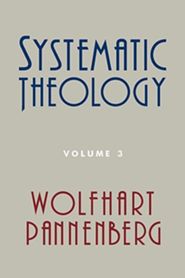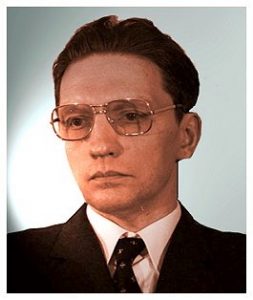R.I.P. Wolfhart Pannenberg (1928-2014)
Wolfhart Pannenberg is one of the first theologians that made any sense to me — and I never really encountered his theological writings until after I graduated from Seminary. I came into Seminary out of a background in the physical sciences. My undergraduate degree was in Chemistry. I attended Asbury Theological Seminary, and I am thankful for the education I received there — and for many of the professors that were teaching there at the time.
But, theology didn’t make sense to me. Instead of appealing to common criterion for proof and rationality it seemed forever attempting to avoid them. If that was the case, how could Christians claim anything that they said was in any sense “true” — or more true or right than anything anyone else said? Furthermore, it appeared to me that the Christian faith did not pay sufficient attention to inductive forms of reasoning.
This was not true in Asbury’s classes on Bible study and interpretation — where an emphasis was placed on inductive forms of Bible study. But, in the area of theology and philosophy of religion I did not see much connection. This was in part due to the age in which I studied theology. This was the era when the prominent (and prominently discussed) theologians were people like Karl Barth, Emil Brunner, Paul Tillich, Reinhold Niebuhr, and (in New Testament studies) Rudolf Bultmann. Of course, Asbury did not agree with many of the perspectives advocated by these theologians — but, it seemed to me, these thinkers very much set the tone of theological discussion in that era. And, I felt that way in spite of the fact that, at the time, our theology classes were called “Doctrine” classes, and we were taught from Nazarene scholar H. Orton Wiley’s 3 Volume Christian Theology. Maybe what I was imbibing was just the spirit of the time. But, I was sure that theology could do better than the likes of either classical Christian liberalism or neo-orthodoxy or Christian existentialism. And, I thought, if it couldn’t, it might be better to just abandon ship. I was interested in the interface between science and theology, but Christian theology seemed to be running from both science and history
The problem was that I was thinking in the language of science, and theology was afraid of science — or of any type of real world verification of its ideas. Evangelical thinkers were not as bad as others in the Christian scene (in this sense), but much of what I read I found unsatisfying. Bear in mind, after I graduated from Seminary I read heavily in Reinhold Niebuhr (very popular among my United Methodist colleagues at the time) and Rudolf Bultmann (because of my interest in New Testament studies). I intensely disagreed with both of these thinkers. I can’t say they haven’t been influential in my thinking, because, really they have been. I disliked their theologies and I have strongly reacted against them. Karl Barth was too paradoxical for me — it all sounded like double talk — though I appreciated his deep reflection on the Scriptures.
So, when I happened upon the writings of Wolfhart Pannenberg it was revolutionary — I finally found a theologian whose writings I liked! In the used book section at Baker Book House I picked up a copy of E. Frank Tupper’s 1973 book The Theology of Wolfhart Pannenberg. I don’t know why I purchased the book or why I began to read it. I think I just wanted to read something different — to learn about the thinking of a writer I had heard of but never read. In retrospect, it would have been better if I had begun with Pannenberg’s 2 Volume Basic Questions in Theology Volume 1, Volume 2 (which collects his early essays) — but I didn’t know that. I had heard of Pannenberg but knew nothing of his ideas. As I began to read Tupper I realized that this was the theologian I wished I had discovered years before! Here was the man who understood my dissatisfaction with the theological thinking of that era. Here was the man who understood the issues of science and theology. Pannenberg’s theological program is amazingly daring. I like this succinct summary (found here):
Pannenberg insisted that it was rational reflection that led him to Christian faith. He believed that faith should be based, not upon feeling or supposed authority, but upon what is known, most reasonable, or most probable. There is such a thing as revelation through which God becomes known, but revelation is not something selected for a few chosen people or even for a chosen nation. Rather, as G. W. F. Hegel suggested at the dawn of the 19th century, God is revealed through history (or reality) as a whole, and God’s revelation can be recognized and understood by reason. Of course, no human being actually knows the whole of history, being limited by time and space. Furthermore, history is not yet complete, and therefore cannot be completely understood. But it is possible for reason to discern in the life, the death, and (especially) the resurrection of Jesus a key to the meaning and an anticipation of the goal of universal history. Pannenberg believed, as Reinhold Niebuhr once argued, that Christianity can be shown to be empirically superior to all alternative interpretations of the meaning of life and history.
 This was precisely the opposite of everything I had been reading — even much of what I read from the conservative, evangelical world. And the attempt to relate the truth of the Christian faith to all of human learning — especially the physical and social sciences — and to do it almost single-handedly — was an awesome project. Even one who fails in such a huge project succeeds in illuminating so much! Pannenberg was a polymath — he absorbed vast knowledge from many fields of learning — all in the interest of expounding the truth claims of Christianity.
This was precisely the opposite of everything I had been reading — even much of what I read from the conservative, evangelical world. And the attempt to relate the truth of the Christian faith to all of human learning — especially the physical and social sciences — and to do it almost single-handedly — was an awesome project. Even one who fails in such a huge project succeeds in illuminating so much! Pannenberg was a polymath — he absorbed vast knowledge from many fields of learning — all in the interest of expounding the truth claims of Christianity.
Michael Root writes (found here):
Pannenberg’s project is breathtaking in its audacity. The theologian must stand ready, at least in principle, to discuss every topic. “A doctrine of God touches upon everything else. Therefore, it is necessary to explore every field of knowledge in order to speak of God reasonably.” Theology so understood seems to require a universal genius, a Leibniz or a Newton. Pannenberg’s range of knowledge is so extensive, one is tempted to believe the job possible. As Placher noted, “It’s hard to think of anything he doesn’t know.”
 So, this is why I so often refer to Pannenberg at this blog. I do not always agree with him but I always find him an interesting beginning point or conversation partner. And, I find that I agree with him more often than not. I have read Pannenberg extensively and have found his writings consistently helpful.
So, this is why I so often refer to Pannenberg at this blog. I do not always agree with him but I always find him an interesting beginning point or conversation partner. And, I find that I agree with him more often than not. I have read Pannenberg extensively and have found his writings consistently helpful.
Not that it’s an easy read. It isn’t. Pannenberg’s writings are characterized by methodological rigor and encyclopedic knowledge. Preachers won’t find any quotes there for Sunday’s sermon. It’s all about what is true — and what is true to the Christian proclamation — not what sounds good. This is why Pannenberg is more widely admired than widely read. His books are often hard work — and readers need to interact and argue with this genius professor as they go along. It is more of an exercise in how to think than an exercise in what to think — though, of course Pannenberg always wants to convince you that he is right. He is always demanding to read. Nevertheless, there is much to be gained by interacting with his amazingly daring theological project.
SOME LINKS. [Links repaired and updated 4-14-2017.]
Tony Jones posts Philip Clayton’s obituary tribute to Wolfhart Pannenberg: Wolfhart Pannenberg—In Memoriam.
From Patrick Oden: Pannenberg (1928-2014). [This link includes all of Oden’s blog posts referring to Pannenberg.]
From Tripp Fuller: Wolfhart Pannenberg (1928-2014). Podcast with Philip Clayton (1 hr. 18 m.): The Theology of Wolfhart Pannenberg w/ Philip Clayton.
From Fred Sanders: Wolfhart Pannenberg (1928-2014), Theological Outflanker.
From Thomas Jay Oord: Pannenberg Dies; An Interview.
Some anecdotes from Roger E. Olson: Wolfhart Pannenberg R.I.P. (Olson also told some Pannenberg stories in an earlier post: Theologians I Have Known: Reflections on Their Personalities Part 1.)
John McClean: Faith and the Future: Wolfhart Pannenberg and What It Means to Tell the Truth About God.
Derrick Peterson: My Tribute to Wolfhart Pannenberg (1928-2014).
Derek Maris: On Remembering Wolfhart Pannenberg & the Future of his Theology.
David Roach (Baptist Press): Theologian Wolfhart Pannenberg dies.
National Center for Science Education: Wolfhart Pannenberg dies.
Leona Foxx: Pannenberg’s Passing.
Brent L. White: Thank you, Wolfhart Pannenberg.
Michael Root (2012): The Achievement of Wolfhart Pannenberg.
Darren Sumner (2011): A Preliminary Response to the Christology of Wolfhart Pannenberg
From the Metanexus Institute: “Confessions of a Trinitarian Evolutionist” (This seems to be a more complete version of Pannenberg’s interview with Thomas Jay Oord, above.) More Pannenberg related material at Metanexus: Wolfhart Pannenberg.
Stanley J. Grenz (1988): Wolfhart Pannenberg’s Quest for Ultimate Truth.
Pannenberg-related posts at this blog: Wolfhart Pannenberg.
Pannenberg-related posts at the Moltmanniac blog: Karl Barth’s Letter to Wolfhart Pannenberg; Pannenberg on Why Christology “From Above” Is Not Feasible for Us; Wolfhart Pannenberg Audio Lectures; Pannenberg Responds to Moltmann’s Critique of Christology “From Below”; Can E.T. Be Saved? (Pannenberg, Redemption…and Aliens).
Some Pannenberg related posts at the PostBarthian blog: Wolfhart Pannenberg on rejecting the Virgin Birth and affirming the Apostles Creed; Wolfhart Pannenberg on the History of Christology.
TWO BOOKS. (I recommend reading Pannenberg himself, but these two books are, nonetheless, helpful discussions.)
Reason for Hope: The Systematic Theology of Wolfhart Pannenberg by Stanley J. Grenz. (A very good introduction or primer on Pannenberg’s theology.)
The Postfoundationalist Task of Theology: Wolfhart Pannenberg and the New Theological Rationality by F. LeRon Shults. (This is a discussion of the relevance of Pannenberg’s epistemology to the postfoundationalist understanding of knowledge. This was written at a time when Shults was still a theist and a Christian.)
WHERE TO START? Anything you read in Pannenberg is going to be tough going. He was a stickler for proper theological methodology and his argumentation is meticulous and well informed — but this doesn’t mean that he is unclear. Start anywhere you’d like, but Jesus: God and Man is an acknowledged classic on the doctrine of Christ; his early essays (bear in mind that he will refine his views through the years) are interesting reading Basic Questions in Theology Volume 1 and Basic Questions in Theology Volume 2; and Grenz’s book (listed above) is the best overview and primer.











Hi there! Quick question that’s totally off topic. Do you know
how to make your site mobile friendly? My website looks weird when viewing from
my apple iphone. I’m trying to find a theme or plugin that might
be able to correct this problem. If you have any recommendations,
please share. Cheers!
The term to look for is the term “responsive.” You want to install a responsive theme.